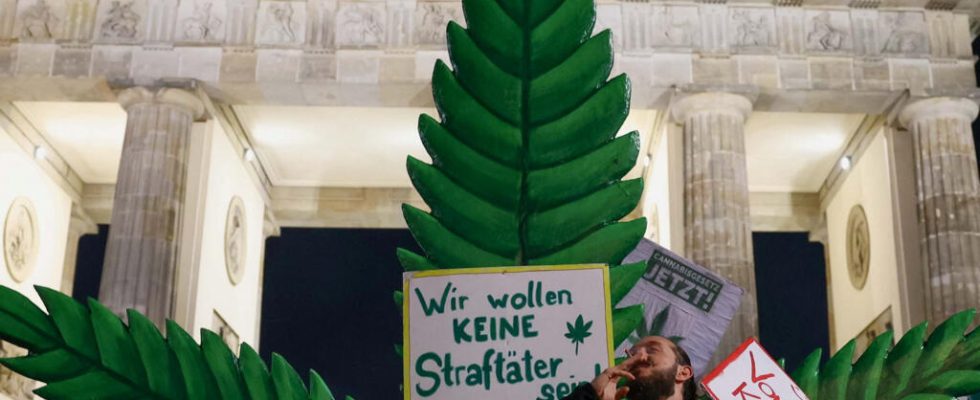In Germany, the partial legalization of cannabis for recreational purposes came into force on Monday, April 1. Now, those over 18 can now grow up to three plants for personal use and purchase cannabis, up to 25 grams per day maximum, through non-profits. A reform promoted by the current government despite numerous criticisms from the opposition, doctors and lawyers.
3 mins
Cannabis is now legal in Germany. Some supporters of legalization demonstrated and smoked their first legal joints, on Sunday, April 1 after midnight, to welcome a reform that they had been waiting for for a long time.
But the rules are numerous and everything is not yet clear. Controls therefore risk being impossible or very complicated. First, comments our correspondent in Berlin, Pascal Thibaut, recreational cannabis is legalized, but for now, only dealers can supply it. Because the clubs where you can shop after joining will only operate from July 1st. For a few hours now, however, you can legally order seeds online to grow up to three plants per person on your balcony, but this requires a little patience.
Now you can legally walk down the street with 25 grams of cannabis in your pocket. And you can have 50 grams of it at home. But be careful, no consumption within 100 meters of schools and kindergartens and in pedestrian areas. The police have already made special cards. She will therefore need small precision balances to know if the authorized quantity is respected. And for 18-21 year olds who are only entitled to one cannabis light, the constabulary will have to check in theory its chemical consumption. And testing for drivers is not available.
Fight against trafficking
The judges will have to reopen 200,000 cases due to the amnesty provided for by the new law.
One of the objectives of the German government is to better regulate drug consumption, but the intention is also to fight against trafficking and organized crime. And on this last point, experiences elsewhere in the world are inconclusive, as explained by the specialist in international crime Michel Gandilhon, member of the scientific orientation council of the Observatory of International Crimes and author of the book, Drugstore, Illicit drugs and trafficking in France. “ The objective is to remove this market from criminal organizations, that is to say, to weaken them. Except that, what we see is that we will not subtract it in its entirety, an illegal market will probably persist, he points. In Colorado, for example, a very liberal state in terms of legalization, 30% of the market is still in the hands of criminal organizations. It still remains a significant proportion. In contrast, Mexican cartels have seen the criminal cannabis market decline, as it has been handed over to private companies. But criminal organizations have taken advantage of the opioid crisis, we are particularly seeing a return of heroin, so many organizations have returned to heroin trafficking. »
The legalization of cannabis, an exception in Europe
With our correspondent in Brussels, Jean-Jacques Héry
Generally speaking, the recreational use of cannabis is largely prohibited in Europe. And with its new legislation, Germany is one of the exceptions: it joins two other European countries having already taken the step towards legalization, namely Malta and Luxembourg. It was in 2021 for Malta, and last year for Luxembourg, each time within a very strict framework, in particular concerning the number of plants and the quantity of product that one is authorized to keep at home. If commercial sale is authorized in Luxembourg, this will not be the case in Germany where cannabis can only be purchased in non-profit associations, cannabis clubs to which you must register.
Then there are countries which have decriminalized such as the Netherlands, Spain or Portugal. The difference is subtle, but it means consumers are not prosecuted. There are consumer clubs in Spain which are tolerated by the authorities. It’s the same thing for the famous coffee shops Dutch. Contrary to what one might think, the retail sale of cannabis is only tolerated, its production and distribution are illegal.
Finally, everywhere else in the EU, possession of cannabis for recreational use remains prohibited. The penalties incurred nevertheless vary greatly: from a fine of 280 euros in Latvia to a maximum of eight years of imprisonment in Cyprus. Obviously, these are adjustable and theoretical sentences.
